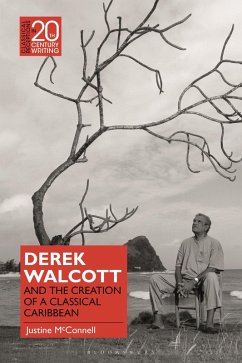Throughout his career, Derek Walcott turned to the literature and cultures of ancient Greece and Rome. His book-length poem recasting the epics of Homer, Virgil and Dante in St Lucia is best-known in this regard, yet Omeros is only the pinnacle of a lengthy and lively dialogue that Walcott developed between the ancient Mediterranean and the modern Caribbean. Derek Walcott and the Creation of a Classical Caribbean explores how, in developing that discourse between ancient and modern, between Europe and the Caribbean, Walcott refuted the suggestion that to engage with literature from elsewhere was to lack originality; instead, he asserted a place for Caribbean art in a global, transhistorical canon.
Drawing on Walcott's own theoretical concerns, this book explores his engagement with Graeco-Roman antiquity from three key perspectives. Firstly, that a perception of time as linear must be coupled with an understanding of it as simultaneous, thereby doing away with the oppressive power of history and confirming the 'New World' on a par with the 'Old'. Secondly, that syncretism lies at the heart of Caribbean life and art, with influences from Africa, Asia, and Europe constituting key parts of Caribbean identity alongside its indigenous cultures. Thirdly, that Caribbean literature creates the world anew without erasing the past.
With these three postcolonial conceptions at the heart of his engagement with ancient Greece and Rome, Walcott revealed the reasons why classical reception has been a rich facet of Caribbean artistry.
Drawing on Walcott's own theoretical concerns, this book explores his engagement with Graeco-Roman antiquity from three key perspectives. Firstly, that a perception of time as linear must be coupled with an understanding of it as simultaneous, thereby doing away with the oppressive power of history and confirming the 'New World' on a par with the 'Old'. Secondly, that syncretism lies at the heart of Caribbean life and art, with influences from Africa, Asia, and Europe constituting key parts of Caribbean identity alongside its indigenous cultures. Thirdly, that Caribbean literature creates the world anew without erasing the past.
With these three postcolonial conceptions at the heart of his engagement with ancient Greece and Rome, Walcott revealed the reasons why classical reception has been a rich facet of Caribbean artistry.

